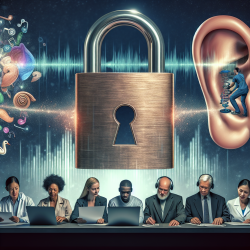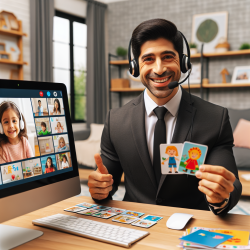In the realm of special education, hearing conservation is often an overlooked but critical component. According to the research article, Some Often Neglected Principles of Hearing Conservation Programming by G. David Zink, there are several key principles that can significantly enhance the effectiveness and efficiency of hearing conservation programs. This blog post aims to shed light on these principles and provide actionable insights for practitioners to improve their skills and encourage further research.
Key Principles of Effective Hearing Conservation
To ensure the success of a hearing conservation program, it is essential to incorporate the following principles:
- Interdisciplinary Cooperation: The research highlights the importance of comprehensive interdisciplinary cooperation. Professionals must work together rather than in isolation to ensure effective aural rehabilitation. Appointing a team coordinator with the competency, time, and resources to monitor the entire program is recommended.
- Longitudinal Follow-Up: Long-term follow-up of each identified case is crucial. Regular monitoring ensures that any changes in hearing ability are promptly addressed, and appropriate interventions are implemented.
- Early Identification: Identifying hearing loss before school entrance is vital. Public Health Clinics should screen children at least twice before they start school, ideally between six to eighteen months and again between twenty-four to thirty-six months.
- Periodic Screening: Hearing conservation programs should continue identification procedures periodically through all grade levels. Screening only at school entrance and one other grade level is insufficient.
- Comprehensive Standardization: The research emphasizes the need for comprehensive standardized hearing conservation programs. These should include identification audiometry, history, audiometric testing, medical examination, and rehabilitation programming, all monitored longitudinally by an interdisciplinary team.
Implementing the Research Outcomes
For practitioners looking to improve their skills, here are some actionable steps based on the research findings:
- Foster Collaboration: Build a network of professionals, including audiologists, speech therapists, and educators, to work collaboratively on hearing conservation programs. Regular meetings and communication channels can facilitate this cooperation.
- Appoint a Coordinator: Designate a team coordinator to oversee the hearing conservation program. Ensure this person has the necessary training and resources to manage the program effectively.
- Conduct Regular Screenings: Implement regular hearing screenings for children at various stages of their educational journey. Use standardized equipment and procedures to ensure consistency and accuracy.
- Provide Training: Offer training sessions for supportive personnel such as aides, assistants, and technicians. Clearly define their roles and ensure their work is carefully supervised.
- Utilize Impedance Audiometry: Explore the use of impedance audiometry in screening programs. While equipment cost and training may be limiting factors, preliminary investigations show promising potential for identifying both conductive and sensorineural lesions.
Encouraging Further Research
While the research article provides valuable insights, there is still a need for further research to address some of the existing gaps. Practitioners are encouraged to:
- Investigate New Technologies: Explore the potential of new screening technologies and methodologies. Comparative studies can help determine the most effective combination of procedures.
- Collect and Analyze Data: Conduct studies to gather valid data on the prevalence and incidence of hearing loss. Standardized data collection and reporting procedures can help build a more accurate picture of the issue.
- Evaluate Current Practices: Regularly review and evaluate current hearing conservation practices. Identify areas for improvement and implement changes based on the latest research findings.
By implementing these principles and encouraging further research, practitioners can significantly enhance the effectiveness of hearing conservation programs, ultimately improving the quality of life for individuals with hearing loss.
To read the original research paper, please follow this link: Some Often Neglected Principles of Hearing Conservation Programming.










